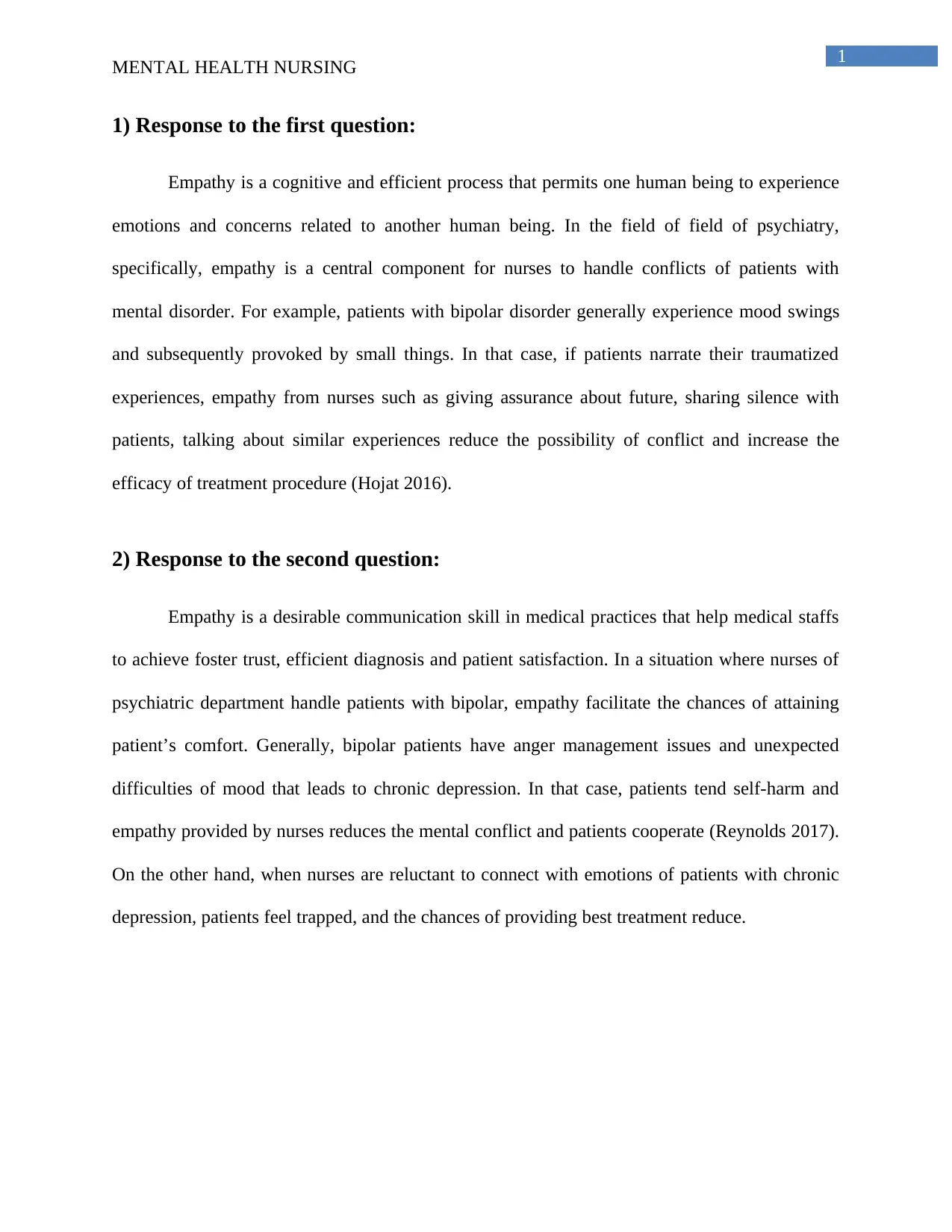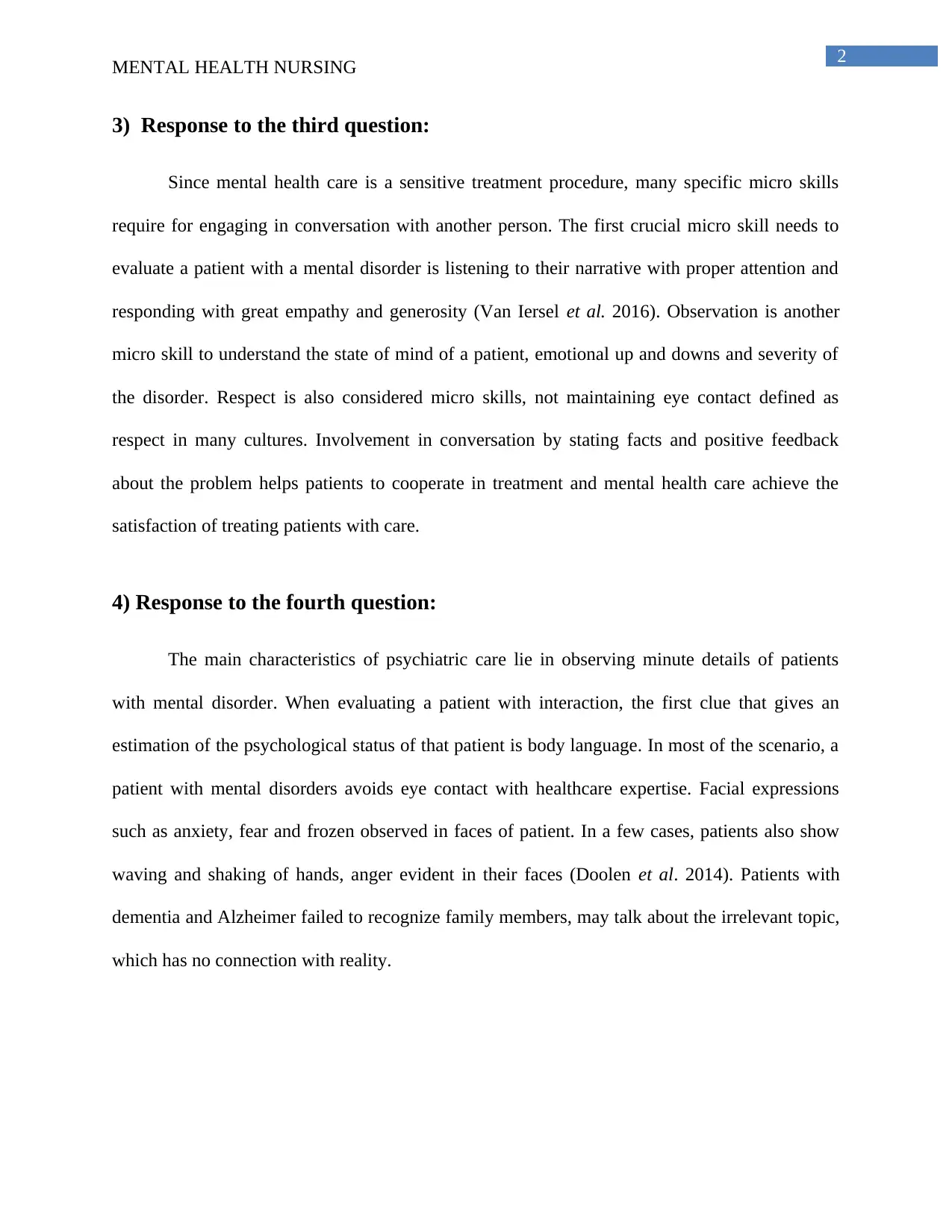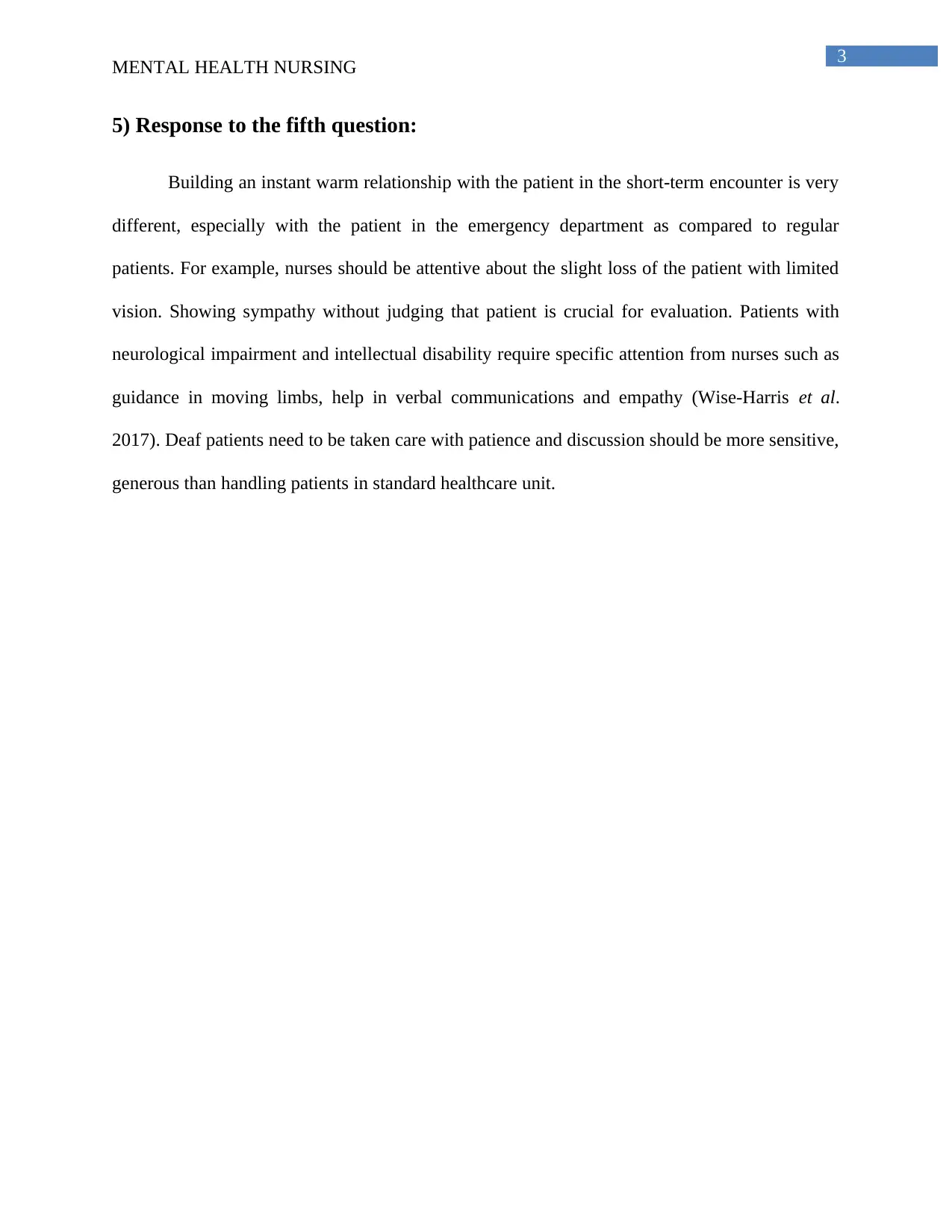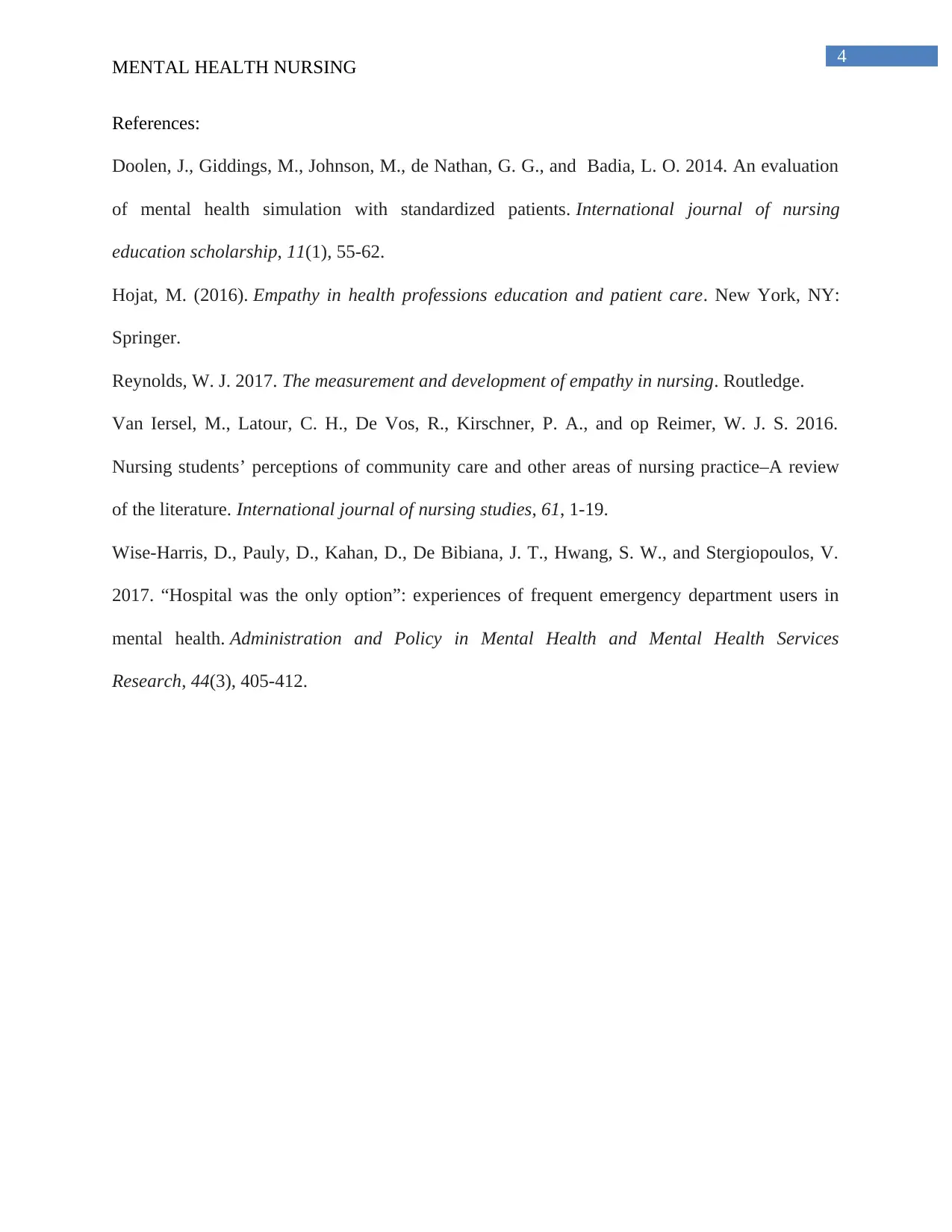Mental Health Nursing: Improving Patient Care Through Empathy Skills
VerifiedAdded on 2023/06/10
|5
|909
|53
Report
AI Summary
This report delves into the crucial role of empathy and observational skills in mental health nursing. Empathy enables nurses to understand and address patients' emotional states, particularly in conditions like bipolar disorder, fostering trust and cooperation. Key micro-skills include attentive listening, empathetic responses, keen observation of verbal and non-verbal cues, and respectful communication. Body language, facial expressions, and patient behavior provide vital insights into their psychological status. Building rapport with patients, especially in emergency situations or with those having neurological impairments, requires tailored approaches, sympathy, and patience. Ultimately, mastering these skills enhances the quality of patient care and ensures better treatment outcomes. The document emphasizes that Desklib provides access to similar assignments and study resources for students.

Running head: MENTAL HEALTH NURSING
Mental health nursing
Name of the student:
Name of the university
Author note:
Mental health nursing
Name of the student:
Name of the university
Author note:
Paraphrase This Document
Need a fresh take? Get an instant paraphrase of this document with our AI Paraphraser

1
MENTAL HEALTH NURSING
1) Response to the first question:
Empathy is a cognitive and efficient process that permits one human being to experience
emotions and concerns related to another human being. In the field of field of psychiatry,
specifically, empathy is a central component for nurses to handle conflicts of patients with
mental disorder. For example, patients with bipolar disorder generally experience mood swings
and subsequently provoked by small things. In that case, if patients narrate their traumatized
experiences, empathy from nurses such as giving assurance about future, sharing silence with
patients, talking about similar experiences reduce the possibility of conflict and increase the
efficacy of treatment procedure (Hojat 2016).
2) Response to the second question:
Empathy is a desirable communication skill in medical practices that help medical staffs
to achieve foster trust, efficient diagnosis and patient satisfaction. In a situation where nurses of
psychiatric department handle patients with bipolar, empathy facilitate the chances of attaining
patient’s comfort. Generally, bipolar patients have anger management issues and unexpected
difficulties of mood that leads to chronic depression. In that case, patients tend self-harm and
empathy provided by nurses reduces the mental conflict and patients cooperate (Reynolds 2017).
On the other hand, when nurses are reluctant to connect with emotions of patients with chronic
depression, patients feel trapped, and the chances of providing best treatment reduce.
MENTAL HEALTH NURSING
1) Response to the first question:
Empathy is a cognitive and efficient process that permits one human being to experience
emotions and concerns related to another human being. In the field of field of psychiatry,
specifically, empathy is a central component for nurses to handle conflicts of patients with
mental disorder. For example, patients with bipolar disorder generally experience mood swings
and subsequently provoked by small things. In that case, if patients narrate their traumatized
experiences, empathy from nurses such as giving assurance about future, sharing silence with
patients, talking about similar experiences reduce the possibility of conflict and increase the
efficacy of treatment procedure (Hojat 2016).
2) Response to the second question:
Empathy is a desirable communication skill in medical practices that help medical staffs
to achieve foster trust, efficient diagnosis and patient satisfaction. In a situation where nurses of
psychiatric department handle patients with bipolar, empathy facilitate the chances of attaining
patient’s comfort. Generally, bipolar patients have anger management issues and unexpected
difficulties of mood that leads to chronic depression. In that case, patients tend self-harm and
empathy provided by nurses reduces the mental conflict and patients cooperate (Reynolds 2017).
On the other hand, when nurses are reluctant to connect with emotions of patients with chronic
depression, patients feel trapped, and the chances of providing best treatment reduce.

2
MENTAL HEALTH NURSING
3) Response to the third question:
Since mental health care is a sensitive treatment procedure, many specific micro skills
require for engaging in conversation with another person. The first crucial micro skill needs to
evaluate a patient with a mental disorder is listening to their narrative with proper attention and
responding with great empathy and generosity (Van Iersel et al. 2016). Observation is another
micro skill to understand the state of mind of a patient, emotional up and downs and severity of
the disorder. Respect is also considered micro skills, not maintaining eye contact defined as
respect in many cultures. Involvement in conversation by stating facts and positive feedback
about the problem helps patients to cooperate in treatment and mental health care achieve the
satisfaction of treating patients with care.
4) Response to the fourth question:
The main characteristics of psychiatric care lie in observing minute details of patients
with mental disorder. When evaluating a patient with interaction, the first clue that gives an
estimation of the psychological status of that patient is body language. In most of the scenario, a
patient with mental disorders avoids eye contact with healthcare expertise. Facial expressions
such as anxiety, fear and frozen observed in faces of patient. In a few cases, patients also show
waving and shaking of hands, anger evident in their faces (Doolen et al. 2014). Patients with
dementia and Alzheimer failed to recognize family members, may talk about the irrelevant topic,
which has no connection with reality.
MENTAL HEALTH NURSING
3) Response to the third question:
Since mental health care is a sensitive treatment procedure, many specific micro skills
require for engaging in conversation with another person. The first crucial micro skill needs to
evaluate a patient with a mental disorder is listening to their narrative with proper attention and
responding with great empathy and generosity (Van Iersel et al. 2016). Observation is another
micro skill to understand the state of mind of a patient, emotional up and downs and severity of
the disorder. Respect is also considered micro skills, not maintaining eye contact defined as
respect in many cultures. Involvement in conversation by stating facts and positive feedback
about the problem helps patients to cooperate in treatment and mental health care achieve the
satisfaction of treating patients with care.
4) Response to the fourth question:
The main characteristics of psychiatric care lie in observing minute details of patients
with mental disorder. When evaluating a patient with interaction, the first clue that gives an
estimation of the psychological status of that patient is body language. In most of the scenario, a
patient with mental disorders avoids eye contact with healthcare expertise. Facial expressions
such as anxiety, fear and frozen observed in faces of patient. In a few cases, patients also show
waving and shaking of hands, anger evident in their faces (Doolen et al. 2014). Patients with
dementia and Alzheimer failed to recognize family members, may talk about the irrelevant topic,
which has no connection with reality.
⊘ This is a preview!⊘
Do you want full access?
Subscribe today to unlock all pages.

Trusted by 1+ million students worldwide

3
MENTAL HEALTH NURSING
5) Response to the fifth question:
Building an instant warm relationship with the patient in the short-term encounter is very
different, especially with the patient in the emergency department as compared to regular
patients. For example, nurses should be attentive about the slight loss of the patient with limited
vision. Showing sympathy without judging that patient is crucial for evaluation. Patients with
neurological impairment and intellectual disability require specific attention from nurses such as
guidance in moving limbs, help in verbal communications and empathy (Wise-Harris et al.
2017). Deaf patients need to be taken care with patience and discussion should be more sensitive,
generous than handling patients in standard healthcare unit.
MENTAL HEALTH NURSING
5) Response to the fifth question:
Building an instant warm relationship with the patient in the short-term encounter is very
different, especially with the patient in the emergency department as compared to regular
patients. For example, nurses should be attentive about the slight loss of the patient with limited
vision. Showing sympathy without judging that patient is crucial for evaluation. Patients with
neurological impairment and intellectual disability require specific attention from nurses such as
guidance in moving limbs, help in verbal communications and empathy (Wise-Harris et al.
2017). Deaf patients need to be taken care with patience and discussion should be more sensitive,
generous than handling patients in standard healthcare unit.
Paraphrase This Document
Need a fresh take? Get an instant paraphrase of this document with our AI Paraphraser

4
MENTAL HEALTH NURSING
References:
Doolen, J., Giddings, M., Johnson, M., de Nathan, G. G., and Badia, L. O. 2014. An evaluation
of mental health simulation with standardized patients. International journal of nursing
education scholarship, 11(1), 55-62.
Hojat, M. (2016). Empathy in health professions education and patient care. New York, NY:
Springer.
Reynolds, W. J. 2017. The measurement and development of empathy in nursing. Routledge.
Van Iersel, M., Latour, C. H., De Vos, R., Kirschner, P. A., and op Reimer, W. J. S. 2016.
Nursing students’ perceptions of community care and other areas of nursing practice–A review
of the literature. International journal of nursing studies, 61, 1-19.
Wise-Harris, D., Pauly, D., Kahan, D., De Bibiana, J. T., Hwang, S. W., and Stergiopoulos, V.
2017. “Hospital was the only option”: experiences of frequent emergency department users in
mental health. Administration and Policy in Mental Health and Mental Health Services
Research, 44(3), 405-412.
MENTAL HEALTH NURSING
References:
Doolen, J., Giddings, M., Johnson, M., de Nathan, G. G., and Badia, L. O. 2014. An evaluation
of mental health simulation with standardized patients. International journal of nursing
education scholarship, 11(1), 55-62.
Hojat, M. (2016). Empathy in health professions education and patient care. New York, NY:
Springer.
Reynolds, W. J. 2017. The measurement and development of empathy in nursing. Routledge.
Van Iersel, M., Latour, C. H., De Vos, R., Kirschner, P. A., and op Reimer, W. J. S. 2016.
Nursing students’ perceptions of community care and other areas of nursing practice–A review
of the literature. International journal of nursing studies, 61, 1-19.
Wise-Harris, D., Pauly, D., Kahan, D., De Bibiana, J. T., Hwang, S. W., and Stergiopoulos, V.
2017. “Hospital was the only option”: experiences of frequent emergency department users in
mental health. Administration and Policy in Mental Health and Mental Health Services
Research, 44(3), 405-412.
1 out of 5
Related Documents
Your All-in-One AI-Powered Toolkit for Academic Success.
+13062052269
info@desklib.com
Available 24*7 on WhatsApp / Email
![[object Object]](/_next/static/media/star-bottom.7253800d.svg)
Unlock your academic potential
Copyright © 2020–2026 A2Z Services. All Rights Reserved. Developed and managed by ZUCOL.




